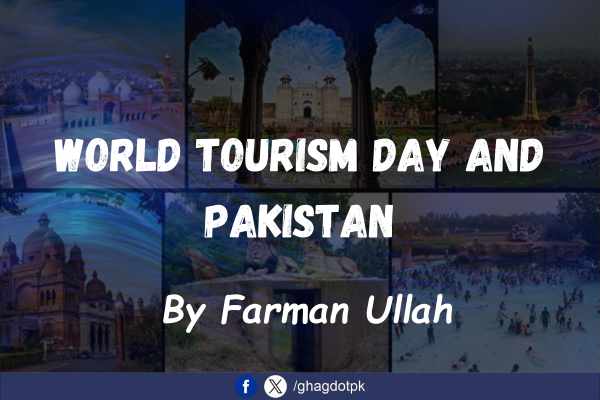By Farman Ullah
Pakistan, a country rich in cultural heritage and natural beauty, is poised to become a premier tourist destination. With its ancient civilizations, stunning landscapes, and diverse ecosystems, Pakistan attracts millions of tourists annually, a significant increase from the previous decade.
Economic Benefits of Tourism
Tourism significantly boosts economic status and global harmony by connecting different cultures, increasing local production rates, and competition among tourism companies. It reduces poverty and supports middle and lower-level economic communities. By 2030, the industry was projected to reach $1.8 billion.
Pakistan’s Hidden Gems
Pakistan is home to ancient civilizations like the Gandhara Civilization the Indus Valley Civilization, and the Mughal Empire. The country boasts world-class heritage sites, including the Gandhara Civilization, ranked among the sixth most beautiful areas on earth. Pakistan’s diverse ecosystem, including mountains, deserts, and forests, is protected by national parks, wildlife sanctuaries and community-controlled hunting areas.
Religious and Cultural Tourism
Religious tourism in Pakistan is a thriving industry, attracting millions of pilgrims and tourists each year. The country is home to numerous sacred sites and shrines revered by Muslims, Sikhs, Hindus, and Buddhists. For Muslims, Pakistan offers iconic destinations such as Data Darbar in Lahore, the shrine of Ali Hujwiri, a renowned Sufi saint, and the Shahbaz Qalandar Shrine in Sehwan Sharif, the tomb of Lal Shahbaz Qalandar, a 13th-century Sufi saint.
Sikhs visit Pakistan to pay homage to their founder, Guru Nanak, at Gurdwara Janam Asthan in Nankana Sahib, his birthplace, and Gurdwara Darbar Sahib in Kartarpur, his final resting place. Other significant Sikh shrines include the Gurdwara Panja Sahib in Hassan Abdal and the Gurdwara Dera Sahib in Lahore.
Hindus flock to ancient temples like Katas Raj Temples in Chakwal, dedicated to Lord Shiva, and Sadh Bela Temple in Sukkur. The Hinglaj Mata Temple in Balochistan, dedicated to Goddess Hinglaj Mata, is another prominent site.
Buddhists explore Pakistan’s rich heritage at Taxila, an ancient Buddhist city and UNESCO World Heritage Site, Mohenjo-Daro, with its Indus Valley Civilization ruins, and Takht-i-Bahi, an ancient Buddhist monastery.
Adventure and Nature-Based Tourism
Pakistan offers nature-based tourism activities like trekking, mountain biking, mountain climbing, whitewater rafting, jeep safaris, trophy hunting, fishing, and wildlife watching. The Karakoram Range, Baltoro Glacier, Chitral Valley, and Deosai National Park attract mountaineers, trekkers, and nature enthusiasts.
Challenges
Pakistan’s tourism industry has the potential to attract both visitors and investors but faces several challenges.
1: Security Concerns
The biggest challenge is security concerns. Terrorist incidents, political instability, and law and order issues deter many tourists from visiting Pakistan. Despite government efforts to improve security, Pakistan’s international image remains incomplete.
2: Infrastructure Deficiency
Inadequate infrastructure hinders access to tourist destinations in Pakistan. Poor road conditions, lack of public transport, and substandard hotel facilities create difficulties for tourists. Upgrading roads, airports, railways, and hotel facilities is essential.
3: Inadequate Global Promotion
Inadequate global promotion of Pakistan’s tourist destinations is a significant issue. Many people are unaware of Pakistan’s breathtaking locations and cultural heritage. Effective marketing and promotion are crucial to raising awareness about Pakistan’s beauty worldwide.
4: Lack of Effective Government Policies
Pakistan’s tourism industry needs comprehensive government policies and cooperation. The lack of effective policies hinders the growth of the industry.
5: Training and Education
The training and education of individuals working in the tourism sector is crucial. Hotel staff, guides, and other related personnel require international-standard training to provide top-notch services to tourists.
6: Environmental Protection
Pollution, litter, and irresponsible use of natural resources at tourist destinations lead to environmental issues. Effective planning and policies are necessary to ensure tourism and environmental conservation go hand-in-hand.
7: Cultural Sensitivity
Tourists visiting Pakistan must respect local culture, traditions, and customs. Similarly, locals should treat tourists with kindness. Awareness campaigns and training programs are essential to promote cultural sensitivity.
Addressing these challenges is crucial for Pakistan’s tourism industry to reach its full potential. By overcoming these obstacles, Pakistan can become a premier tourist destination, attracting visitors and investors from around the world.






